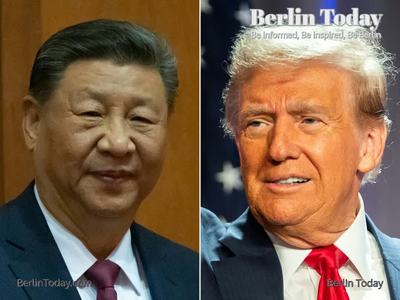
EU Proposes Elimination of Tariffs on Industrial Goods Amid Renewed Tensions with the U.S.
Ursula von der Leyen suggests a 'Zero-Zero' plan as transatlantic trade relations shift.
Ursula von der Leyen, President of the European Commission, has introduced a proposal to eliminate all tariffs on industrial goods between the European Union and the United States.
This initiative comes in the context of heightened tensions in transatlantic trade relations, particularly following recent announcements from U.S. President Donald Trump regarding trade policies.
Known informally as the 'Zero-Zero' idea, the proposal seeks to foster economic cooperation by reducing trade barriers that have complicated business exchanges between the two regions.
The backdrop of this initiative is marked by a significant shift in trade dynamics.
Trump's recent statements suggest a recalibrating of the U.S. approach toward trade negotiations, potentially signaling a willingness to engage in new dialogue over tariff reforms.
Analysts note that the timing of von der Leyen's proposal might strategically align with these developments, as both the EU and the U.S. grapple with economic pressures arising from global supply chain disruptions.
The EU's proposal emphasizes the need for a cooperative trade environment, aimed at mutual economic benefits.
Eliminating tariffs on industrial goods could lower production costs and increase market access for companies operating in both jurisdictions.
Advocates within the EU argue that this could drive innovation and competitiveness, especially in key sectors affected by tariffs, such as automotive and technology.
However, the feasibility of such a proposal remains in question.
Trade experts caution that significant political hurdles exist, particularly given the domestic political landscape in the U.S. Factors such as congressional approval, regional interests, and the implications for domestic industries could complicate negotiations.
Furthermore, both the EU and U.S. have historically used tariffs as tools for protecting their economies, making a complete elimination challenging.
The discussion around the 'Zero-Zero' initiative is further complicated by ongoing issues relating to trade practices, including concerns over subsidies, labor standards, and environmental regulations.
Future talks are expected to address not only tariff elimination but also broader issues influencing transatlantic trade relations.
The outcome of these discussions will be closely watched by stakeholders in both regions, as the implications of any agreement could reshape the economic landscape.
As the situation develops, both the EU and the U.S. appear poised to reassess their trade strategies in light of changing global conditions, with the outcome potentially influencing international trade policies beyond the Atlantic.
This initiative comes in the context of heightened tensions in transatlantic trade relations, particularly following recent announcements from U.S. President Donald Trump regarding trade policies.
Known informally as the 'Zero-Zero' idea, the proposal seeks to foster economic cooperation by reducing trade barriers that have complicated business exchanges between the two regions.
The backdrop of this initiative is marked by a significant shift in trade dynamics.
Trump's recent statements suggest a recalibrating of the U.S. approach toward trade negotiations, potentially signaling a willingness to engage in new dialogue over tariff reforms.
Analysts note that the timing of von der Leyen's proposal might strategically align with these developments, as both the EU and the U.S. grapple with economic pressures arising from global supply chain disruptions.
The EU's proposal emphasizes the need for a cooperative trade environment, aimed at mutual economic benefits.
Eliminating tariffs on industrial goods could lower production costs and increase market access for companies operating in both jurisdictions.
Advocates within the EU argue that this could drive innovation and competitiveness, especially in key sectors affected by tariffs, such as automotive and technology.
However, the feasibility of such a proposal remains in question.
Trade experts caution that significant political hurdles exist, particularly given the domestic political landscape in the U.S. Factors such as congressional approval, regional interests, and the implications for domestic industries could complicate negotiations.
Furthermore, both the EU and U.S. have historically used tariffs as tools for protecting their economies, making a complete elimination challenging.
The discussion around the 'Zero-Zero' initiative is further complicated by ongoing issues relating to trade practices, including concerns over subsidies, labor standards, and environmental regulations.
Future talks are expected to address not only tariff elimination but also broader issues influencing transatlantic trade relations.
The outcome of these discussions will be closely watched by stakeholders in both regions, as the implications of any agreement could reshape the economic landscape.
As the situation develops, both the EU and the U.S. appear poised to reassess their trade strategies in light of changing global conditions, with the outcome potentially influencing international trade policies beyond the Atlantic.
Translation:
Translated by AI
AI Disclaimer: An advanced artificial intelligence (AI) system generated the content of this page on its own. This innovative technology conducts extensive research from a variety of reliable sources, performs rigorous fact-checking and verification, cleans up and balances biased or manipulated content, and presents a minimal factual summary that is just enough yet essential for you to function as an informed and educated citizen. Please keep in mind, however, that this system is an evolving technology, and as a result, the article may contain accidental inaccuracies or errors. We urge you to help us improve our site by reporting any inaccuracies you find using the "Contact Us" link at the bottom of this page. Your helpful feedback helps us improve our system and deliver more precise content. When you find an article of interest here, please look for the full and extensive coverage of this topic in traditional news sources, as they are written by professional journalists that we try to support, not replace. We appreciate your understanding and assistance.











